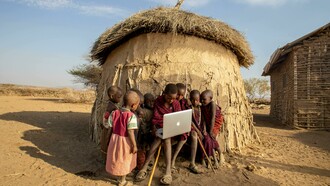The exploitation of nature and the exploitation of women are intimately connected. They will both end when we recognize the earth as a living being, and women as autonomous individuals.
(Vandana Shiva)
As the world faces mounting ecological crises, a constantly evolving movement draws connections between environmental degradation and gender inequality. Known as ecofeminism, this perspective highlights how patriarchal structures not only exploit women but also deplete the earth’s resources, raising urgent questions about how we humans treat both.
The roots of ecofeminism
The term “ecofeminism” was first coined in the 1970s by French feminist Françoise d’Eaubonne. The movement gained traction as activists and thinkers such as Vandana Shiva and Maria Mies examined the intersections between feminist struggles and ecological challenges. Ecofeminism is grounded in the idea that the same systems of power and control that marginalize women also harm the environment. According to Daniela Bernal Diaz, a Colombian eco-feminist biologist, ecofeminism „seeks to give a voice to women as well as to non-human animals and the other components of nature, who have been invisibilized, silenced, and exploited. It is precisely from this struggle that women and nature have a voice and rights, and that is fundamental“.
For example, Shiva critiques what she calls “maldevelopment,” an economic model focused on industrial growth at the expense of sustainability. This approach, she argues, devalues both the unpaid labor of women and the ecosystems they often rely on, perpetuating cycles of inequality and destruction.
Historically, women have been positioned as stewards of the natural world, often as caregivers or agricultural workers. This intimate connection to nature, while sometimes romanticized, places them on the frontlines of environmental crises. The consequences are far-reaching, from increased health risks due to pollution to greater vulnerability during natural disasters.
A gendered impact of environmental crises
The disproportionate burden of climate change and ecological collapse on women is a recurring theme in ecofeminist discourse. Across the globe, women are more likely to bear the responsibilities of securing food, water, and energy for their households. In regions affected by water scarcity, for example, women often walk miles daily to collect clean water.
Additionally, environmental degradation exacerbates gender-based health risks. Studies show that exposure to pollution from mining, industrial agriculture, or deforestation increases respiratory illnesses and pregnancy complications for women. These realities highlight the urgent need to include gender perspectives in environmental policymaking.
Women at the forefront of environmental justice
Despite these challenges, women worldwide have emerged as leading advocates for environmental and social justice. Indigenous women’s groups in Latin America, such as Bolivia’s „Red de Mujeres Transformando la Economía” or Colombia‘s „Fuerza de Mujeres Wayúu“, have been highly instrumental in defending their lands from extractive industries while promoting sustainable agriculture.
On a global scale, ecofeminist leaders like Vandana Shiva advocate for biodiversity and seed sovereignty. These efforts challenge industrial farming practices that prioritize profits over ecological and community health. Shiva’s campaigns emphasize the importance of local, women-led initiatives in crafting sustainable solutions to global challenges.
Ecofeminism, however, is not just a grassroots movement. It also informs academic and policy debates, pushing back against anthropocentric models that prioritize short-term economic gains over the well-being of ecosystems and societies.
A blueprint for the future
At its heart, ecofeminism asks critical questions: How can we build a society that values care and cooperation as much as competition and consumption? What would a world look like where both nature and women are treated with respect and dignity?
The answers may lie in rethinking the systems that underpin modern life. Ecofeminism encourages us to move beyond the dualities of nature versus humanity, masculine versus feminine, and public versus private. Instead, it advocates for interconnectedness—acknowledging that human well-being is inseparable from the health of the planet.
This philosophy is particularly relevant as governments and organizations seek solutions to the climate crisis. Policies that prioritize gender equity and environmental justice are not just ethical but practical. Research consistently shows that empowering women leads to more sustainable outcomes, whether through improved resource management or enhanced community resilience.
Moving forward
For readers wondering how to make a difference, ecofeminism offers both inspiration and direction. Supporting women-led environmental initiatives, advocating for gender-inclusive policies, and rethinking personal consumption patterns are practical steps anyone can take. At a time when the consequences of environmental neglect are impossible to ignore, ecofeminism reminds us of the profound connections between humanity and the earth. As Vandana Shiva aptly puts it, “The care of the earth is the care of the people.”
If our current systems have led us to the brink, ecofeminism offers a vision for a future rooted in balance, equity, and respect. The question now is whether we are ready to embrace it.















